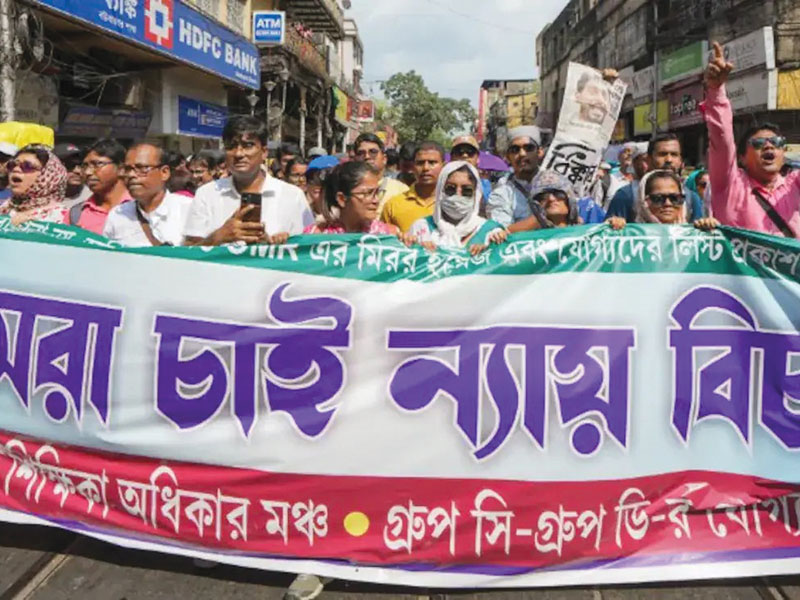Baishali Mukherjee (Kolkata)
WB teachers protesting SC verdict
An april 3 supreme court judgement scrapping the appointment of 25,735 secondary and higher-secondary teachers appointed by the state government in 2016, has inflicted a massive blow to the Mamata Banerjee-led Trinamool Congress (TMC) government of West Bengal (pop.109 million). An apex court bench comprising Chief Justice Sanjiv Khanna and Justice Sanjay Kumar nullified the appointment of all teachers appointed nine years ago stating that the “entire recruitment process is irreparably tainted and invalid… the scale of fraud and manipulation, along with efforts to cover it up, has destroyed the credibility of the process”. The judges directed the state government to initiate a new recruitment process to be completed by December 31, with those adversely affected by the 2016 recruitment scandal eligible to write the state government’s Teacher Eligibility Test (TET) even if they had crossed the exam eligibility age (40).
Evidently disconcerted about the political fallout of the scathing criticism and abrupt termination of service of over 25,000 government school teachers, on April 7, the West Bengal Board of Secondary Education (WBSSE) appealed to the court praying modification of the order. Relenting, the court permitted “untainted” teachers to teach in their classrooms until December 31.
It is also pertinent to note that two years ago on May 12, 2023, a single bench of Justice Abhijit Gangopadhyay of the Calcutta high court had nullified the appointment of 32,000 government school teachers who had not completed the teachers’ training programme after they cleared the TET of 2014. The appeal of the West Bengal Board of Primary Education (WBBPE) challenging this cancellation is posted for hearing in the Calcutta high court on May 7.
The education sector has been witnessing massive scandals unfold since 2015, with widespread corruption and mismanagement jeopardising the teacher recruitment process for 84,000 state government and aided schools, leaving an entire generation of students at the mercy of a broken educational system. Corruption charges include selecting government school teacher candidates arbitrarily, bypassing rules and regulations of the West Bengal School Service Commission Act, 2009. Reports of aspirant teachers landing jobs after paying bribes of Rs.18-20 lakh and some recruited after submitting blank answer sheets, have been rife for several years.
Central government agencies including the Central Bureau of Investigation (CBI) and the Enforcement Directorate (ED) have already arrested prominent TMC leaders, party members and senior education ministry officials, including Partha Chatterjee, former education minister; Arpita Mukherjee, a close associate of Chatterjee; and Manik Bhattacharya, TMC MLA and former chairman of the West Bengal Board of Primary Education.
Unsurprisingly, nullification of 26,000 teacher appointments has plunged West Bengal’s schools, already suffering acute teacher shortages, into severe crisis. With exams underway and classes still being held, teaching and discharging administrative tasks simultaneously has become nearly impossible. Moreover, with 46,000 para teachers on strike demanding higher wages, the state’s primary-secondary education system is in the throes of a deep crisis. According to Krishnanshu Mishra, General Secretary of the West Bengal Headmasters’ Association, in some government schools 10-12 teachers are obliged to teach 2,000 students.
As a result, the number of children dropping out of schools statewide is rising. West Bengal which has the country’s highest drop-outs ratio — 18.75 percent from secondary education (according to a Union education ministry release dated January 7) — is confronted with a snowballing youth unemployment crisis as 7-8 million dropouts and school-leavers enter the jobs market annually. A significant decline in the number of students writing higher secondary exams — 2.8 lakh fewer this year — is a pointer to youth disengagement and loss of trust in the education system.
Comments Swapan Mandal, General Secretary of the Bengal Teachers and Employees Association (BTEA): “The disqualification of so many teachers by the Supreme Court will severely damage the foundation of the academic system and lead to further erosion of educational standards in the state.”
As people at the bottom of West Bengal’s iniquitous socio-economic pyramid who send their children to government schools grapple with the consequences of continuous corruption within the public education system, Chief Minister Banerjee’s promise of poribartan made in 2011 is evoking bitter reaction. With the weight of judicial verdicts bearing down on her administration, next year’s assembly elections are likely to prove the Waterloo of Bannerjee and the TMC for conspicuous failure to deliver on the very reforms that propelled them to power over a decade ago.
